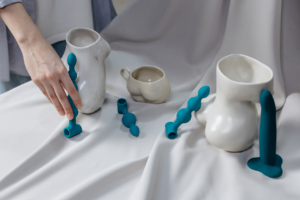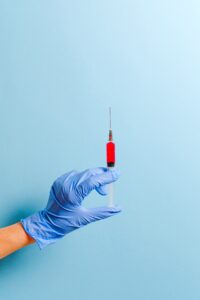
How STIs Affect the Body and Mind
Understanding how STIs are transmitted, breaking down the stigma associated with Sexually Transmitted Infections (STIs), and exploring how STIs affect the body and mind has been a big part of my work as a Pelvic Floor Physical Therapist.
(NOTE: STIs are often referred to as STDs, though this term is outdated and associated with shame, which we will get into later in this post.)
How STIs are Transmitted
Wondering how STIs affect the body and mind? We’ll get there, but let’s first explore how STIs are transmitted.
Sexually Transmitted Infections can affect the mouth, genitals, and/or anal areas of the body and are spread mainly through oral, vaginal, or anal sex with an infected partner— though they can also be spread through sexual skin-to-skin contact, such as fingering and/or hand-jobs.
In some cases, some STIs can also be spread from an infected mother (birthing person) to her child during the birthing process (some of these include syphilis, gonorrhea, chlamydia, hepatitis B, and genital herpes).
Understanding these modes of transmission is the first step to understanding how STIs affect the body.
STIs can be viral, bacterial, or parasitic.
A viral infection is caused by a virus and cannot be cured. The fact that viral STIs are noncurable can have a large impact on how STIs affect the body. Though a virus will remain in the body for life, symptoms of the virus might not be present at all times. Viral infections include:
- Human papillomavirus (HPV)
- Herpes (HSV or herpes simplex virus)
- Human immunodeficiency virus/acquired immune deficiency syndrome (HIV/AIDS)
- Hepatitis B
A bacterial infection is caused by a bacterial organism, and the active infection can usually be cured with early treatment. A bacterial STI must be treated early to ensure that the damage it can cause to the body, such as pelvic floor related issues, can be repaired. Bacterial infections include:
- Chlamydia
- Gonorrhea
- Syphilis
A parasitic STI is a sexually transmitted infection that’s caused by a parasite— an organism that lives on or in a host body and gets its food at the expense of the host. Parasitic STIs are generally treated with pills or topical medications. Parasitic infections include:
- Trichomoniasis
- Scabies
- Pubic Lice
- Giardia
Of these STIs, 7 are currently curable: syphilis, gonorrhea, chlamydia, pubic lice, scabies, giardia, and trichomoniasis.
Sexually Transmitted Infections, no matter their origin or nature, can have long-term effects on the body, including infertility, sterility, chronic pelvic pain, immune deficiency, pelvic floor damage, and pelvic inflammatory disease.
While these infections can often cause pain through the physical effects such as scar tissue and painful wounds, in many cases the mental health issues associated with the shame of dealing with the stigma of STIs also carry dangers as well. That is why it is important not only to discuss how STIs affect the body but also how they affect the mind and why it is so important to break the stigma of STIs.
Breaking The Stigma Associated with STIs
Outside of discussing how STIs affect the body, it is important to also consider the mental load one encounters when dealing with STIs. Unloading the mental health piece associated with STIs is a complicated conversation to have, but it is essential to creating safety and security for the 1 in 5 people who will be affected by a Sexually Transmitted Infection in their lifetimes.
One of the most important ways we can disassemble the stigma associated with STIs is by increasing our own sexual literacy, then working to normalize conversations around STIs with our friends, families, and teens on the commonality of STIs. Part of that sexual literacy and normalization piece comes from the ability to keep up with changing terms and language associated with STIs and sexuality.
While you’ll often see STIs and STDs used interchangeably, there has been a shift in recent years to STI only because the concept of “disease” is different than that of an “infection”.
To put it simply, sexually transmitted infections, or STIs, are infections that have not yet developed into diseases. For people who have been diagnosed with an STI but received treatment quickly enough to avoid developing into the status of disease, the designation between the two terms can feel significant. Language matters; that is why it is important to use the term STI when discussing this topic.
If you’re wondering about how STIs affect the body when it comes to this mental health piece, keep reading.
How STIs Affect the Body
As a pelvic floor physical therapist, how STIs affect the body and mind affect the work that I do. If a person affected with an STI is struggling with the mental health effects of having an STI, such as shame, guilt, or stress, this can have a psychosomatic effect on the pelvic floor itself. This mental health piece is a big part of how STIs affect the body. Stress is a strong indicator of the tensity of the pelvic floor– which can lead to a whole host of problems in itself, including urinary incontinence, bowel evacuation disorder, and more.
How STIs affect the body and how they affect the mind are deeply related due to and the physical effects of STIs on the pelvic floor can include tension, scarring, wounds, and development of disease, such as Pelvic Inflammatory Disease, and present a whole host of different struggles and subsequent Pelvic Floor Physical Therapy solutions that are unique and different to each patient I work with.
In addition to the actual physical therapy element of my work with patients who have or have had STIs, I will also talk about safe sex practices, avoiding masturbation or sex when they are in a flare (for certain STIs), how to do skin checks, and addressing pelvic floor tension.
If you are someone with an STI or STD and you are wondering how STIs affect the body of yours personally, and/or you are looking for help with healing or keeping your pelvic floor healthy, you can book a FREE 20-minute discovery call with me.
If you’d like to learn more about all things pelvic floor health, including more on how STIs affect the body and mind + how I’m working to break down STI stigma, head over to my Instagram.
Some of the links on this page may be affiliate links. Laura Meihofer’s LLC is a participant in the Amazon Associates Program and others, as an affiliate advertising program designed to provide a means for sites to earn advertising fees by linking to products Laura organically uses and trusts. If you purchase a product through an affiliate link, your cost will be the same, but Laura will automatically receive a small commission. Your support is greatly appreciated and helps her spread her message!








Sorry, the comment form is closed at this time.